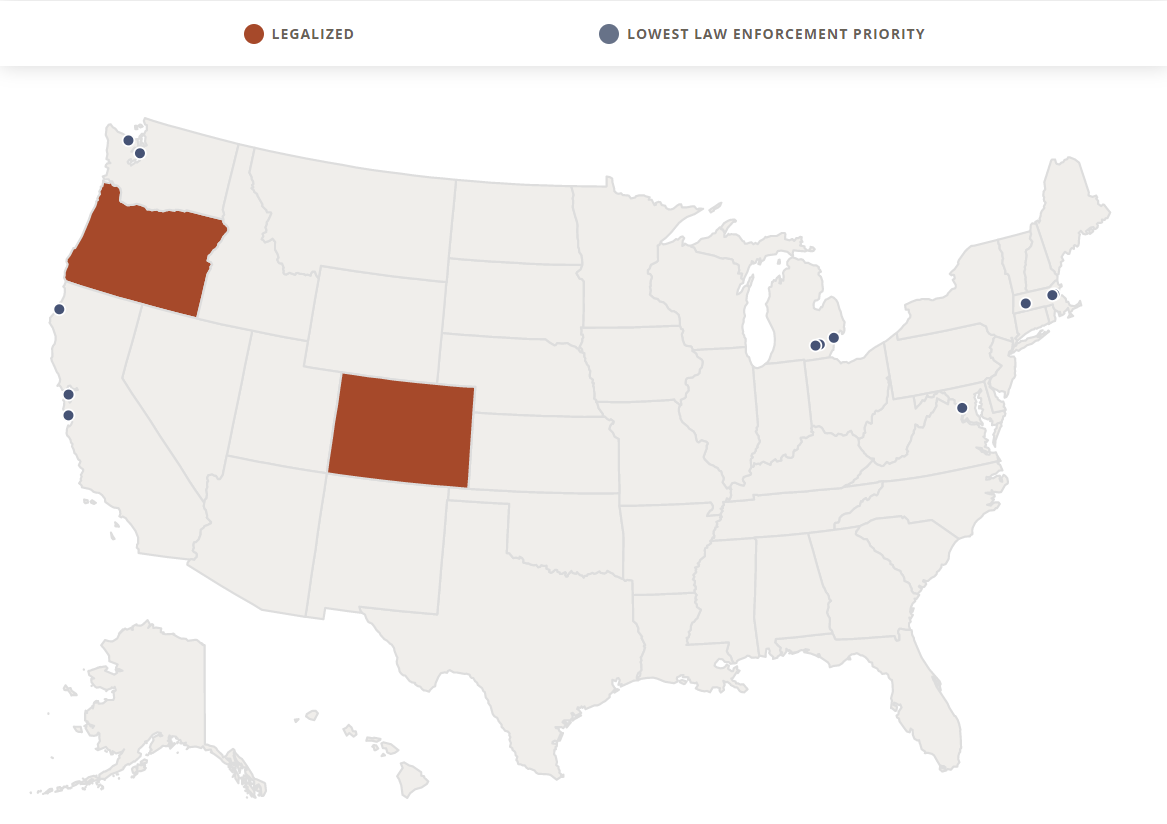In March of this year, the Washington State Legislature passed Senate Bill 5693. Section 211, subpart 99 of this bill directs the Washington State Health Care Authority (HCA) to create a psilocybin work group to assess the feasibility of bills like Senate Bill 5660 (see our initial take on that one here). In particular, the work group will investigate whether state sanctioned psilocybin services are appropriate for Washington. Further, the work group will assess Measure 109, Washington cannabis regulations, and potential psilocybin regulations in Washington.
The work group must deliver a preliminary report to the Washington State Governor and Legislature by December 1, 2022 and a final report by December 1, 2023. The work group scheduled five meetings: June 2022, August 2022, October 2022, March 2023, and May 2023. In this post we will discuss the work group’s first two meetings.
Meeting 1: June 30, 2022
The work group began its first meeting by clarifying its scope. It operates under the HCA, which is the Washington state agency for Medicaid and public employee benefits. The HCA does not have licensing functions, and since psilocybin is a Schedule I substance under the Federal Controlled Substances Act, Medicaid cannot currently pay for psilocybin. So, while the work group will provide insights into licensure and regulation in Washington, the HCA would not solely regulate psilocybin services.
Next, the work group discussed Measure 109 and Oregon’s psilocybin regulations. Although Measure 109 establishes a regulatory framework for psilocybin consumption, it does not allow retail sales or off-site consumption. Oregon must track all psilocybin products, and psilocybin is limited to adults over 21 years of age. The Oregon Psilocybin Advisory Board (OPAB) made regulation recommendations in June 2022, the Oregon Health Authority (OHA) will adopt regulations in December 2022, and will begin accepting psilocybin service applications from businesses in January 2023.
The work group then discussed Oregon psilocybin administrative rules. OPAB has five subcommittees that made recommendations for rules in five areas: equity, training, research, products, and licensing. OPAB recommended rules for four types of licenses: Manufacturer, Testing Lab, Facilitator, and Service Center. OPAB recommended specific rules for each type of license. For example, a manufacturer must obtain consent from the property owner to produce psilocybin, and a facilitator must complete an OHA approved training program before applying for licensure.
OPAB also recommended rules for each session of psilocybin services: preparation, administration, and integration. For instance, a client must give informed consent during the preparation session in order to move on to the administration session. Additionally, OPAB recommended rules for tracking psilocybin and psilocybin products as mandated by Measure 109.
The meeting ended with a discussion about the results of a work group survey, where members expressed their opinions on psilocybin-related issues. The survey showed members want to duplicate aspects of Measure 109 for Washington, such as the two-year development period, promote access for end-of-life care, and decriminalize psilocybin. In contrast, members wanted to avoid restrictions in Measure 109 by allowing at-home administration, and enabling micro-dosing outside of service centers. Additionally, most members agree that safety is their top priority for a Washington psilocybin program. For more results of the survey, review the presentation slides here.
View the US Map of Psilocybin Legality by State
Meeting 2: August 4, 2022
During its second meeting the workgroup heard a presentation by Jim Morgan, the CFO of the Washington Liquor and Cannabis board (LCB). Morgan focused on the methods of tracking cannabis and cannabis products in Washington state, providing examples of how Washington could track psilocybin products. The Washington cannabis industry has five types of licenses: Grower, Processor, Retailer, Transportation, and Research. All of which require cannabis tracking.
The big lesson learned from the Washington cannabis industry was to have specific tracking systems already in place. LCB had no tracking systems specific to cannabis, which made tracking complex and difficult. At first, LCB tried tracking cannabis with a system for tracking pharmaceuticals. After three years, LCB had to switch to another system to improve tracking. However, this second system was even more problematic than the first. Finally, on June 30, 2022 LCB phased out that system and implemented their current system. The current system more effective than the first two, because it is specifically tailored to Washington cannabis rules and statutes.
The work group then heard from Duncan Stuard of the Center for Evidence-based policy. Stuart gave an overview of the national landscape of psilocybin laws. Twenty-one states have introduced bills and ballot initiatives related to psilocybin. However, not all states are following the Oregon model for psilocybin access. Some state laws require medical diagnosis, some allow use for wellbeing, and others allow individuals to possess and use psilocybin themselves. Overall, eight bills passed, five are in committees, and three were pushed to the next session. We will discuss these bills further in a future post.
The second meeting ended with another survey of the members’ opinions. Again, members expressed support for microdosing, with nine out of thirteen members strongly supporting it. Members also supported a “wellness” model over a “clinical” model to broaden access to psilocybin services. Eight out of thirteen members felt psilocybin services should be covered by both private insurance and state funding. The work group also revisited opinions on Oregon’s model, with members showing the most support for decriminalizing psilocybin and requiring only a high-school diploma for facilitators.
Outlook
While Washington has not passed legislation allowing psilocybin services, initiating this work group shows the legislature is considering it. Outside of Washington and Oregon, states across the nation are moving toward less restrictions for psilocybin as a consumable substance. Though, the federal government shows no signs of removing psilocybin from the CSA. Like cannabis, psilocybin-friendly states will be in conflict with the federal government. It is unclear if the federal government will maintain its “hands-off” approach for both cannabis and psilocybin.
___
Troy Sims is an associate attorney at Piskel Yahne Kovarik, PLLC in Spokane, WA. He focuses on business law, commercial litigation, real estate law and construction law. You may contact him at tsims@pyklawyers.com, or connect with him on LinkedIn.



























